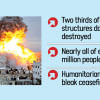The war tactic of starvation in Gaza

The term "Holodomor" refers to the famine-induced mass killings of millions of Ukrainians under the Soviet regime, from 1932-1933. Only in 2006, the Holodomor was recognised by the European Parliament as the man-made process of "starvation as a manifestation of genocidal action."
As Muslims around the world prepare for Eid, the world is currently witnessing another episode of Holodomor unfolding in the Occupied Gaza Strip. The Palestinians, one of the most vulnerable populations in the history of modern warfare, are on the brink of a man-made famine. Starvation, commonly interpreted as a method of warfare, can cripple a population from its core, sometimes arguably more efficiently than any other modern weaponry with prolonged sufferings associated as a result of armed conflict. By now, the world is acquainted with Israel's devastating military operation and the resulting extensive civilian casualties, destruction of infrastructures, and starvation of an overwhelming population of over 2.2 million Gazans. Truth be told, starvation has been the fate of every two out of three Gazans for the past 17 years of partial blockade on humanitarian aid by Israel and Egypt.
On January 26, 2024, the International Court of Justice (ICJ), through a provisional order, also acknowledged "the extent of the human tragedy that is unfolding in the region." The court observed that the military operation conducted by Israel has created an acute food and water crisis for the remaining few Palestinians in the Gaza Strip.
Other than Article II (c) of the 1948 Genocide Convention argued in the ICJ case, there are a plethora of international laws underlining starvation as one of the deadliest forms of destruction in modern warfare. These laws prohibit employing starvation as a means of warfare and subsequently draw examples from the ongoing humanitarian crisis in the Gaza Strip, to denote—if words are capable of doing so—the inhumane sufferings of the Palestinian population.
What the international humanitarian law says
Rule 53 and Rule 54 of the customary international humanitarian law (IHL) explicitly prohibit the use of starvation as a method of warfare in both international and non-international armed conflict. These provisions have become a customary norm through state practice, and the inclusion of this prohibition on military manuals of different states also renders the same message. Interestingly, Israel's Manual on the Laws of War itself embodies that the prohibition of starvation "clearly implies that the city's inhabitants must be allowed to leave the city during a siege." In line with this view, the UN and other international organisations have also viewed blockades and embargoes on accessing humanitarian aid as a clear indication of deliberately causing starvation upon an entire population. Ironically, since the Hamas attack, the scale, rigour, and speed of destruction of civilian infrastructure and enforcement of the siege in Gaza have surpassed any other man-made famine in the last 75 years. The World Food Programme reported approximately 500 aid trucks a day containing food were supplied to Gaza before the war, which, after the recent Israeli invasion, came down to 127 trucks of limited aid, which are incapable of supporting over two million people.
Additional protocols to the Geneva conventions
Complementary to the four Geneva conventions, the adoption of two additional protocols in 1977 strengthened the protection of victims of international (protocol-I) and non-international (protocol-II) armed conflicts from intentional starvation respectively. Specifically, Article 54 (2) of Additional Protocol-I expressly prohibits "any attack, destruction, and removal of any objects indispensable to the survival of the civilian population, such as foodstuffs, agricultural areas for the production of foodstuffs, crops, livestock, drinking water installations and supplies and irrigation works" to starve out the civilian population. In no event can military actions be accepted to harm the sustenance of a population with inadequate food resources to cause deliberate starvation or forceful displacement of an adverse party to an international armed conflict. With Israel's full-scale military ground offensive operations, it is reported approximately 22 percent of agricultural lands in northern Gaza have been razed along with the destruction of 70 percent of Gaza's fishing fleet. This has created an alarming condition where accessing humanitarian relief is even more limited than the minimum reliefs available at southern governorates.
Rome Statute of International Criminal Court
The Rome Statute as the founding document of the International Criminal Court (ICC) categorises the prohibited conduct of armed conflicts as "war crimes." It operates as a deterrent to prevent the breaches of IHL by ensuring justice for the victims. Article 8 (2) (b) (xxv) of the Rome Statute entails criminal responsibility for committing war crimes in international armed conflicts by intentionally using starvation as a method of warfare. To prove the conduct of causing starvation as a war crime under this provision before the ICC, it has to be proven that the perpetrator possesses an acute knowledge of the conduct and consequences of any such acts. Since the Hamas-led attack on Israel, their high-ranking officials have made public statements expressing their aim to deprive the Gazan population of food, water, and aid as the military policy of their forces. This intent has been manifested by impeding humanitarian aid, razing agricultural lands, and destroying the sustenance of the entire Palestinian population. All of it amounts to war crimes.
International human rights law
The International Human Rights Law (IHRL) provides a fertile ground for reinforcing collective and individual fundamental human rights by complementing the commitments of IHL and ICL. The founding documents of IHRL including the Universal Declaration of Human Rights (UDHR), the International Covenant on Civil and Political Rights (ICCPR), and the International Covenant on Economic, Social, and Cultural Rights (ICESCR) respectively impose both immediate and progressive obligations on the states to safeguard the fundamental human rights of all people even during wartime. The right to food as a fundamental human right has been enshrined in all of these nearly universally accepted treaties as well as in several other multilateral and regional instruments. Moreover, the human rights lens in the context of armed conflict offers a substantial ground to establish the criminal intent of committing war crimes under the ICL where the perpetrators corroborate intentional starvation to dismantle a population's present and generations unborn. Other human rights commitments such as the Responsibility to Protect (RtoP) enumerate the international community's obligation to prevent mass atrocities including starvation. Given the current range and extent of the atrocities committed and supported by powerful States, the RtoP commitments have significantly failed. The UN special rapporteur on the right to food, Michael Fakhri, quotes "famine was imminent and now inevitable" in Gaza as the United States and nine other countries have suspended additional funding to the UN Relief and Works Agency for Palestinian Refugees (UNRWA). UNRWA's funding crisis is threatening the basic human right to access food for the survival of the Palestinian population in an already meagre supply of minimum humanitarian aid able to cross through Egyptian and Israeli checkpoints.
On March 25, 2024, the United Nations Security Council (UNSC) unanimously adopted a draft resolution with 14 votes in favour and an abstention from the US, calling for a "lasting and immediate ceasefire," to facilitate unrestricted aid supplies amid the risk of an impending famine and release of all captives. The laws that are applicable to incriminate Israel, however, have not been applied to put an end to the ongoing genocide. At this point when the humanitarian catastrophe in Gaza has wiped out an entire generation with the remaining half looking for a piece of bread to survive.
Jannatul Ferdous Jannat is research consultant at Asia Justice Coalition and a postgraduate student in criminology and criminal justice at the University of Dhaka.
We welcome your contributions and analysis of global events. To submit articles to our weekly page, Geopolitical Insights, please send an email to [email protected]
Follow The Daily Star Opinion on Facebook for the latest opinions, commentaries and analyses by experts and professionals. To contribute your article or letter to The Daily Star Opinion, see our guidelines for submission.

 For all latest news, follow The Daily Star's Google News channel.
For all latest news, follow The Daily Star's Google News channel. 










Comments